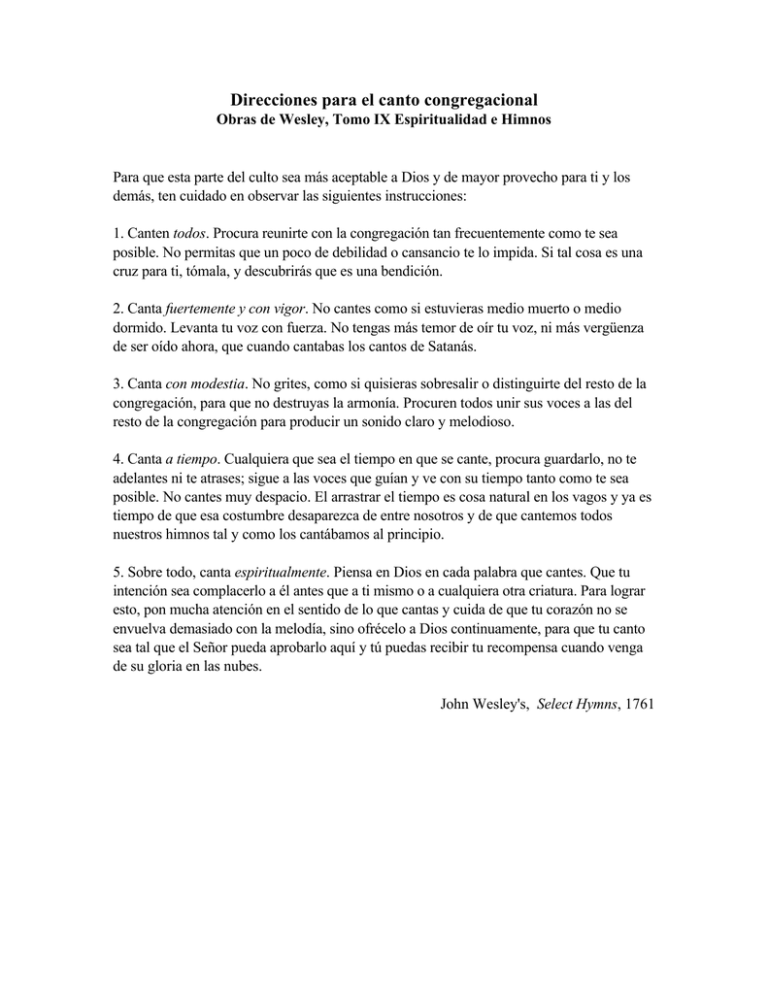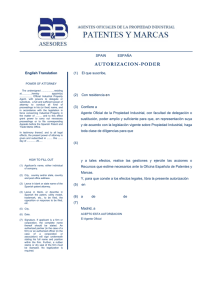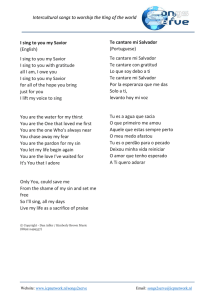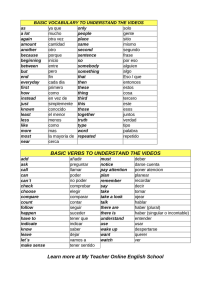Direcciones para el canto congregacional
Anuncio

Direcciones para el canto congregacional Obras de Wesley, Tomo IX Espiritualidad e Himnos Para que esta parte del culto sea más aceptable a Dios y de mayor provecho para ti y los demás, ten cuidado en observar las siguientes instrucciones: 1. Canten todos. Procura reunirte con la congregación tan frecuentemente como te sea posible. No permitas que un poco de debilidad o cansancio te lo impida. Si tal cosa es una cruz para ti, tómala, y descubrirás que es una bendición. 2. Canta fuertemente y con vigor. No cantes como si estuvieras medio muerto o medio dormido. Levanta tu voz con fuerza. No tengas más temor de oír tu voz, ni más vergüenza de ser oído ahora, que cuando cantabas los cantos de Satanás. 3. Canta con modestia. No grites, como si quisieras sobresalir o distinguirte del resto de la congregación, para que no destruyas la armonía. Procuren todos unir sus voces a las del resto de la congregación para producir un sonido claro y melodioso. 4. Canta a tiempo. Cualquiera que sea el tiempo en que se cante, procura guardarlo, no te adelantes ni te atrases; sigue a las voces que guían y ve con su tiempo tanto como te sea posible. No cantes muy despacio. El arrastrar el tiempo es cosa natural en los vagos y ya es tiempo de que esa costumbre desaparezca de entre nosotros y de que cantemos todos nuestros himnos tal y como los cantábamos al principio. 5. Sobre todo, canta espiritualmente. Piensa en Dios en cada palabra que cantes. Que tu intención sea complacerlo a él antes que a ti mismo o a cualquiera otra criatura. Para lograr esto, pon mucha atención en el sentido de lo que cantas y cuida de que tu corazón no se envuelva demasiado con la melodía, sino ofrécelo a Dios continuamente, para que tu canto sea tal que el Señor pueda aprobarlo aquí y tú puedas recibir tu recompensa cuando venga de su gloria en las nubes. John Wesley's, Select Hymns, 1761 Directions for Singing I. Learn these tunes before you learn any others; afterwards learn as many as you please. II. Sing them exactly as they are printed here, without altering or mending them at all; and if you have learned to sing them otherwise, unlearn it as soon as you can. III. Sing all. See that you join with the congregation as frequently as you can. Let not a single degree of weakness or weariness hinder you. If it is a cross to you, take it up, and you will find it a blessing. IV. Sing lustily and with good courage. Beware of singing as if you were half dead, or half asleep; but lift up your voice with strength. Be no more afraid of your voice now, nor more ashamed of its being heard, then when you sung the songs of Satan. V. Sing modestly. Do not bawl, so as to be heard above or distinct from the rest of the congregation, that you may not destroy the harmony; but strive to unite your voices together, so as to make one clear melodious sound. VI. Sing in time. Whatever time is sung be sure to keep with it. Do not run before nor stay behind it; but attend close to the leading voices, and move therewith as exactly as you can; and take care not to sing to slow. This drawling way naturally steals on all who are lazy; and it is high time to drive it out from us, and sing all our tunes just as quick as we did at first. VII. Above all sing spiritually. Have an eye to God in every word you sing. Aim at pleasing him more than yourself, or any other creature. In order to do this attend strictly to the sense of what you sing, and see that your heart is not carried away with the sound, but offered to God continually; so shall your singing be such as the Lord will approve here, and reward you when he cometh in the clouds of heaven. From John Wesley's Select Hymns, 1761





